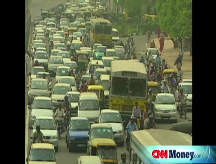Commuting: More than pain at the pump
IBM study shows traffic nuisances go beyond high gas prices, raising levels of stress and lowering productivity.
NEW YORK (CNNMoney.com) -- As gasoline prices near $4 a gallon, daily commuters are experiencing more than just pain in their wallets, according to a new study.
In fact, the daily drive causes a large number of commuters everything from increased stress and anger to sleep deprivation and loss of productivity at work, according to IBM Corp.'s (IBM, Fortune 500) Institute for Electronic Government commuter pain survey, released Friday.
Nearly half (45%) of the 4,091 respondents polled in 10 major metropolitan areas said that traffic congestion increased their stress levels. Another 28% said it heightened their feelings of anger. Almost one in five said commuting problems cut down on their productivity at work and in school and a full 12% said they were sleep deprived.
The traffic toll. Almost two-thirds (63%) of the poll respondents said that traffic has worsened over the last three years. In Los Angeles and Atlanta, the two with the lowest commuter pain threshold, that number jumps to 70%. Only respondents living in Minneapolis and Miami (15% each) said that traffic has improved.
Commuting has become so bad for some that more than a quarter of respondents said they've simply turned around and gone home. The two biggest culprits: start-and-stop traffic and rude drivers.
Because traffic delays are typically random, commuters have to budget a larger amount of time to get from here to there. "It's starting to control our lives in very subtle ways," said Janet Caldow, director of IBM's Institute for Electronic Government.
The Institute has been devising ways to help cities deal with increased traffic congestion, and has helped deploy automated tolling, congestion pricing plans and real-time traffic modeling in cities such as Brisbane, London, Singapore and Stockholm.
In the U.S., driving is by far the main way most people get to work: 68% of respondents said they drove to work alone, and 91% said that driving was their main mode of transportation all other times.
The gas price effect. As gasoline prices keep setting records, commuting habits may soon change. The study found that high gas prices are prompting many to seriously consider other transportation options.
"The gas prices have kind of pushed things over the edge," said Caldow.
At the time of the study, gasoline was at a national average of $3.67 a gallon. At a price level of $3.50 a gallon, 9% of respondents said they would consider changing their commuting habits.
Since the study was conducted, gas prices have steadily pushed higher. Retail gas has hit a record $3.962 a gallon on average nationwide, auto group AAA reported Friday. Gas prices have hit records for 23 straight days and risen for 24 days in a row.
In the IBM study, an additional 22% said they would seek other commuting options if gas hits $4 a gallon, and if prices make it to $5 a gallon, a total of 66% of drivers said they would look for new ways of commuting.
Gas prices in 12 states, including California - home to Los Angeles commuters - are already over $4 a gallon, according to AAA.
To help alleviate traffic problems, drivers said they wanted more options to work from home, improved public transportation, and better road condition information. ![]()



